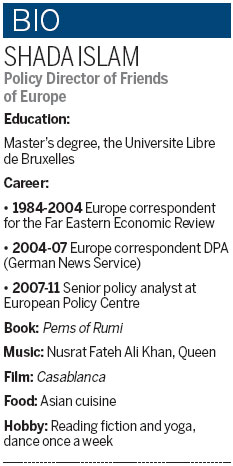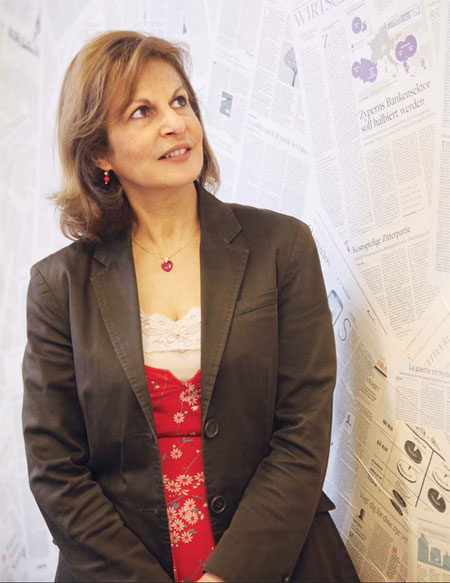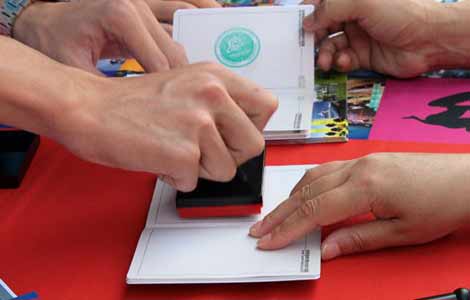Engagement without illusion
Updated: 2013-09-20 15:39
By Fu Jing (China Daily)
|
|||||||||||
Brussels should change old perceptions and accept new realities on China, says expert
Apragmatic, hands-on approach based on trust will help smoothen the wrinkles in China-European Union relations, says Shada Islam, a researcher and expert on European affairs.
Islam, a former journalist and policy director of Friends of Europe, a think-tank in Brussels, says the EU needs to press for more informal consultations with Beijing on a host of issues. "What we need now is a "shirt-sleeve" approach, much like the talks in June between Chinese President Xi Jinping and US President Barack Obama at a California estate. Chinese and European leaders must have the vision and farsightedness to press ahead, despite current short-term hiccups in ties," she says.
According to Islam, discussions will also help dispel the notion that bilateral relations are influenced by stereotyped notions.
Islam, who has tracked China and Asia for more than three decades, says the leadership change in Brussels next year when there will be a new European Commission, a new EU high representative for foreign and security policy and a newly-elected European Parliament could augur well for bilateral relations. "We will see more fresh thinking and lots of fresh approaches to bilateral issues from next year onward," she says.
Sitting in her office in downtown Brussels, Islam says that the resurgence of Asia, and in particular China, has been a wake-up call of sorts for Brussels.
"I hope the new EU leadership will adopt a more deep-rooted, far-sighted and strategic approach and be more aware of the changed global realities," she says.
Elucidating her point further, Islam says Brussels often clings to its old perceptions about China and other countries in Asia. But Asia has changed in many ways and this requires a rethink of EU policy toward them.
China and Europe share many challenges: They both have to meet the aspirations of their people for growth and development. In addition, the EU needs to switch mindsets in order to deal with China and other Asian countries as equal partners.
The demand for sustained engagement with China is steadily increasing. China's reform agenda and its huge market are increasingly becoming important for companies in Europe too, Islam says.
"It (the changed perception of China) is really something fascinating that needs to be studied more closely." Islam says that some of the fascination has also given way to misconceptions. "I think there is a lot of confusion in Europe on what to do with China. But Europe is not the only one that is confused, as there are still several aspects that China itself does not understand," Islam says.
Both Brussels and Beijing need to manage expectations of each other. She says that though Brussels has been searching for a long-term role in the bilateral relationship, it is more important to discover the answers on a daily basis, she says.
The arms embargo is still a thorny factor in bilateral relations, she says. "The Europeans don't want to change their opinion as they do not have the internal consensus to do so. It is the same with the question of giving China full market economy status. In my view, these are legacies of the past and should not be barriers for developing a new 21st century partnership."

The EU is facing a "leadership vacuum" and has very few leaders who really understand China and its growth. "The EU needs leaders who are visionary and far-sighted enough to work with China to deal with the 21st century challenges," Islam says.
"Both sides need visionaries and suitable mechanisms to keep trust and dialogue open even if there are difficulties. The biggest challenge, however, is the absence of strategic trust. It is lacking in Europe due to the recent financial crisis and the job loss fears.
"It has also led to a kind of zero sum thinking, where many in Europe feel that if China wins, Europe loses. It is this zero-sum mindset that is coming in the way of shared interests and sustained engagement," Islam says.
She says that though the EU believes China is an equal power, there are some people who are afraid that China will dominate the EU economy, echoing fears of Japanese domination in the 1980s.
"I think that the fear and language used about the economic might of China today and Japan yesterday are exactly the same. The only difference is that the Europeans today also have to deal with the Rise of India, the Republic of Korea and Indonesia as well."
According to Islam, the EU needs more dynamic leaders such as former trade commissioner Pascal Lamy, former external affairs commissioner Chris Patten and former foreign policy chief Javier Solana, to direct future bilateral engagements. These three men in their own way played a significant role in strengthening and fostering Sino-EU relations during the early days, she says.
Leaders like Lamy played a key role in China's World Trade Organization entry, she says. "There was a great deal of discussion on various aspects of China's economic and trade policy during those days. It was fascinating as it was something that was totally unknown then".
Islam says China's process of reform and market liberation and meeting international standards, after joining the WTO has been impressive. "I think that though it was a long and painful negotiation, it was worth it considering the change it has brought to mainstream trade," she says.
She also remembers the changes in EU policy toward China with the arrival of Chris Patten. "It is quite remarkable that when he came to Brussels as commissioner for external relations, he was determined and committed to strengthening ties between Europe and China," Islam says.
"I would say that unlike in the past, China is now getting a lot more respect in Europe."
Many European companies often complain that the market in China is restricted. "But they should also remember that many European companies made huge profits in China in the past and are doing so today," she says. "China is integral to the global economy. All sides must stop being prisoners of the past."
Islam says that because she is a Pakistani by birth, Belgian by adoption, and European by conviction, she is not trapped in a narrow world view. "I don't have a one-sided view of the world."
Islam says that China and Europe should look at what they can do together to tackle the common challenges they face rather than focus on their differences and divisions.
Li Xiaofei contributed to the story.
fujing@chinadaily.com.cn
|
Shada Islam says Brussels needs to press for more informal consultations with Beijing on many issues. Fu Jing / China Daily |
(China Daily European Weekly 09/20/2013 page32)
Today's Top News
Verdict of Bo Xilai: Life in prison
Russian embassy to Syria shelled
Gunmen holding hostages in Nairobi
Amber alert across Asia, but not red
China signs 12 deals with Venezuela
Bo Xilai gets life in prison
New Sino-US ties sought
One Chinese killed in Nairobi attack
Hot Topics
Lunar probe , China growth forecasts, Emission rules get tougher, China seen through 'colored lens', International board,
Editor's Picks

|

|

|

|

|

|






